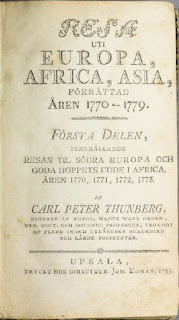 |
| London Zoo 1979-5 シロサイ Ceratotherium simum |
ケンペルはオランダから昇汞(mercurius sublimatus corrosivus)を携えて,アフリカ・アジアへの旅に出発した.これを梅毒の特効薬として日本で売って,旅費の一部にしようと考えていたのであろう*. 鎖国下の日本へ行くにはオランダ人になりきる必要があったので、ツンベルクは1772年から三年間、オランダのケープ植民地(現在の南アフリカ連邦の南部)で生活し,オランダ語に習熟した.ケープ地方に滞在していた 1773 年に,彼は犀の角から作られた「犀角杯」が,当地ではその中に注がれた液体が有毒な場合には,検出し,さらにその毒性を消すと聞いて,昇汞水や他の有毒な液性薬物で実験したが,「犀角杯」にはそのような作用はないと結論付けた.
Thunberg, Carl Peter 『一七七○〜一七七九年にわたるヨ-ロッパ、アフリカ、アジア紀行
“Resa uti Europa, Africa, Asia, förrättad åren 1770-1779 - - “』J. Edman (1791), p275
“Cap 1773
Enhorningshorn
(Rhinoceros) ågdesoch förvarades af någre både på
landetoch i staden, fåfom en raritet och såfom et godt medel, både uä
(jukdomaroch at uptåcka förgift. Fint Ikafvit ochingifvit trodde de det bota
convulfionerocli ryckningar hos barn. At bågare,håraf svarfvade, skulle uptåcka
gift i dendryck, fom flögs deruti och göra, aten fådan förgiftad dryck (kulle
aldelesgåfa ut öfver kärilet, trocides almint. De horn, som tagas af en ung
kalf, fom Snnu ej parats, fadés vara de båfte och fåkrafte. Af fådane
fvarfvasbägare, fom infattas i guld eller filfver,och bortlkånkas åt
Potentater, Magnater och vånner, eller fåljas dyrt, ftundom til 50 R:sd. Hornet
är conilkt, tjockt nedtfl och trubbigt uptil, hosgamle Enhörningar ofta af en
fots högd,fittande framtil på nosen. Två eller tretum ifrån detta horn fitter
på den Africanike tvåhömingen et annat mindreoch kortare horn. Til färgen liknar
detmåft oxhorn. Då jag förfökte desfehornen , både rå och svarfvade til
bågrar,både unge och gamle , med flere fortersvagare och starkare förgifter,
fant jagderaf ingen rörelfe eller gåsning; utandå solution af mercurius
sublimatus corrosivus, aqva phagaedenica eller andre slogos uti et
sådant horn, upstego endaft någre vatn-blådror, fom forosaka des af den luft,
som var innesluten i hornets porer och nu skilde fig derifrån.”
"Travels in Europe, Africa, and Asia,
Made Between the Years 1770 and 1779; in Four Volumes: Containing travels in
the empire of Japan, and in the islands of Java and Ceylon, together with the
voyage home” Volume 1. F. and C. Rivington, (1795)
“The horns of
rhinoceros were kept by some people both in town and country, not only as
rarities, but also as useful in diseases, and for the purpose of detection
poison. As to the former of these intentions, the fine shaving of the horns
taken internally, were supposed to cure convulsions and spasms in children.
With respect to the latter, it was generally believed, that goblets made of
these horns in a turner’s lathe, would discover a poisonous draught that was
put into them, by making the liquor ferment till it ran quite out of the
goblet. Such horns as were taken from a young rhinoceros calf that had not yet
copulated, were said to be the best, and the most to be depended upon. Of
these, goblets are made, which are set in the gold and silver, and made
presents of to kings, peoples of distinction and particular friends, or else
sold as a high price, sometimes at the rate of 50 rix-dollars a goblet.
The horn is of a
conical form, thick at the bottom, and blunt at the top, a foot long,
frequently in old rhinoceroses, and is placed forward on their snout. Two or
three inches from this, the African two-horned rhinoceros has another smaller
and shorter horn. In colour, it most resembles the horn of a bullock.
When I tried
these horns, both wrought into goblets, and unwrought, both old and young
horns, with several sorts of poisons, weak as well as strong, I observed not
the least motion of effervescence; but when a solution of corrosive sublimate; aqua
phagaedenica, or other similar substances, were poured into one of these horns,
there arose only a few bubbles, produced by the air, which had been inclosed in
the pores of the horn, and which was now disengages from it.”
「犀の角は珍奇な物としてだけではなく,治療薬として,また毒物を検出する目的で,都会や田舎双方の人が所持している.前者の意図に関しては,角の細粉を服用すると子供の痙攣や引き付け(攣縮)を治療すると考えられていた.後者に関しては,犀の角から旋盤加工で作られた杯は,その中に注がれた有毒な液性の薬物を,液が杯から溢れ出すまで泡立たせることによって検出すると一般的に信じられていた.このような角は交接しない若い犀から取られた角が最上であり,(その性能は)もっぱら,これに依ると言われていた.この種の杯は,金や銀で飾られ,王や高位な人々,また特別な友人に贈り物として作られ,また,時には一つの杯が50 rix-dollars もの高価格で売られていた.
(犀の)角は,一フィートほどの長さで,底は太く上は鈍い円錐形で,老齢の犀の場合はしばしば,口吻から突き出している.アフリカ産の二つの角を持つ犀では,もう一つ,より小さく短い角が,2から3インチ離れた場所に出ている.色は,若い牡牛の角に最もよく似ている.
私が,精巧な細工した角杯,加工していない角杯,若い犀の角杯,老いた犀の角杯,弱い或は強い毒物で試したところ,いずれの組み合わせでも全く発泡の兆候は認められなかった.しかし,昇汞及び
aqua phagaedenica 或は類似の薬物の溶液を,これらの盃の一つに注いだ時に,空気によってつくられた少数の泡が発生したのみであったが,これは角の細孔に入っていた空気が細孔から遊離した物である.」(英訳よりの私訳)
と,いかにも科学者らしい検証実験を行い,犀角杯の迷信を否定した.
犀角粉の薬効や,犀角杯の毒消しや毒物感知の効果は,欧州では知られていなかったようだが,ケープ植民地で,犀角が貴重品として高値で売買されていたのは,中国本草の影響と考えられる.
 |
| 三才図会 + 和漢三才図会(NDL) 獸類 犀 |
日本でもこの薬効は信じられ,天平勝宝8歳(756年)6月21日に,光明皇后が60種の薬物を東大寺大仏に献納した際の目録『盧舎那仏に奉る種々薬』,一般に『種々薬帳』と呼ばれる文書に,「第一櫃(中略)犀角三箇 一重二斤十二両一分 一重一斤九両二分/一重一斤十四両/犀角一帒重六斤十三両并帒」とあり,これらは,全て使用されてしまったからか,現存しないが,「犀角器一口 重九両三分」との記録もあり(http://square.umin.ac.jp/mayanagi/paper04/shiryoukan/me091.html),美しい甲乙二つの「犀角杯 (さいかくのつき)」が現在まで伝えられている.(http://shosoin.kunaicho.go.jp/ja-JP/Treasure?id=0000010040,http://shosoin.kunaicho.go.jp/ja-JP/Treasure?id=0000010041 )
この信仰は長く続き,江戸時代の寺島良安著『和漢三才図会』(1713頃)の「犀」の項にも「犀角〔苦酸鹹、寒〕 足の陽明の薬で,よく一切の諸毒を解する」とある.
*ツンベルクは日本で「一角」が高価で取引されているのを聞いて,バタビアで,当地の有力者ボエル氏より冒険貸借
(Bottomry) で借り入れた 1000
rix-dollar で購入した37カッチェ4テール6マース(およそ21kg)の一角を出島に持ってきた.その日本での売却値は 5071テール1マース (= c.a. 507両,1200万円くらい)で,「これまでの借金を返済できるようになったし,その上,1200レイクスダールを日本で好きな学問に費やすことが出来た」(C・P・ツュンベリー『江戸参府随行記』高橋文訳 東洋文庫 583(1994),pp.59~60).1200 rix-dollar は 200両とすると,500万円弱.ツンベルクは「日本人はその医学的効能・効果を,寿命を延ばし,精力をつけ,記憶を増進し,どんな愁訴にも効くと誇大に考えている」と言っている.
一方,オランダから持参した「昇汞」の売り込みには,成功しなかった.「私はオランダからなにがしかの昇汞(しょうこう)mercurius sublimatus corosivus〔塩化第二水銀〕を持ってきた。そして大勢の人が性病を患っていることから、私の当地滞在中に、この薬には大変な需要があるであろうことが十分に読みとれた。にもかかわらず、私はこの国の医師にわずかたりとも売ることはできなかった。」(上記訳本)
一方,オランダから持参した「昇汞」の売り込みには,成功しなかった.「私はオランダからなにがしかの昇汞(しょうこう)mercurius sublimatus corosivus〔塩化第二水銀〕を持ってきた。そして大勢の人が性病を患っていることから、私の当地滞在中に、この薬には大変な需要があるであろうことが十分に読みとれた。にもかかわらず、私はこの国の医師にわずかたりとも売ることはできなかった。」(上記訳本)


0 件のコメント:
コメントを投稿